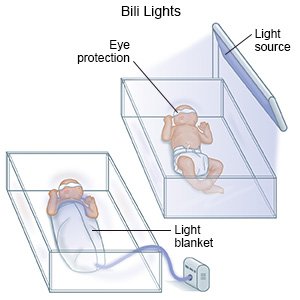Jaundice in Newborns
Medically reviewed by Drugs.com. Last updated on Aug 4, 2025.
Jaundice is yellowing of your newborn's eyes and skin. It is caused by too much bilirubin in the blood. Bilirubin is a yellow substance found in red blood cells. It is released when the body breaks down old red blood cells. Bilirubin usually leaves the body through bowel movements. Jaundice happens because your newborn's body breaks down cells correctly, but it cannot remove the bilirubin. Jaundice is common in newborns. It usually happens during the first week of life.
WHILE YOU ARE HERE:
Informed consent
is a legal document that explains the tests, treatments, or procedures that your child may need. Informed consent means you understand what will be done and can make decisions about what you want. You give your permission when you sign the consent form. You can have someone sign this form for you if you are not able to sign it. You have the right to understand your child's medical care in words you know. Before you sign the consent form, understand the risks and benefits of what will be done to your child. Make sure all of your questions are answered.
An IV
is a small tube placed in your child's vein that is used to give medicine or liquids.
Healthcare providers will check your child's vital signs.
Vital signs include blood pressure, heart rate, breathing rate, and temperature. The providers will also ask you or your child about his or her pain.
Daily weight:
Your newborn will be weighed daily to make sure he or she is not losing weight. Weight loss may be a sign that your newborn is dehydrated.
Related medications
Feeding:
Breastfeed your newborn as early and as often as possible. Talk to your newborn's healthcare provider about using formula along with breast milk if you do not produce enough breast milk alone. Look for signs of thirst in your newborn, such as lip smacking and restlessness. Try to breastfeed 8 to 12 times daily for the first few days to boost your milk supply. Ask your healthcare provider for help if you have trouble breastfeeding.
Intake and output:
Healthcare providers may need to know how much liquid your newborn is drinking and urinating. Healthcare providers will weigh his or her diapers to see how much he or she is urinating. Do not throw away diapers before you ask a healthcare provider.
Blood tests:
Blood tests may be done to monitor your newborn's bilirubin level and to look for the cause of jaundice. These tests may be needed every few hours.
Treatment:
Your newborn may need any of the following if the bilirubin level in his or her blood becomes very high:
- Phototherapy is a procedure that uses light to turn bilirubin into a form that your newborn's body can remove. One or more lights will be placed above your newborn. He or she will be placed on his or her back to absorb the most light. Your newborn may also lie on a flexible light pad, or his or her healthcare provider may wrap him or her in the light pad. Eye covers may be used to protect his or her eyes from the light.

- Exchange transfusion is a procedure used to replace part of your newborn's blood with blood from a donor. This will be done if your newborn has severe jaundice.
- Intravenous immunoglobulin is medicine given during phototherapy or exchange transfusion. Your newborn will receive the medicine if he or she has a blood disorder and his or her bilirubin continues to rise.
Treatment options
The following list of medications are related to or used in the treatment of this condition.
RISKS:
Too much bilirubin in your newborn's blood may lead to brain damage. The damage may cause disorders such as hearing loss and cerebral palsy. Rarely, severe jaundice may lead to breathing problems, uncontrolled seizures, and coma. Severe jaundice may be life-threatening.
CARE AGREEMENT:
You have the right to help plan your baby's care. Learn about your baby's health condition and how it may be treated. Discuss treatment options with your baby's healthcare providers to decide what care you want for your baby.© Copyright Merative 2025 Information is for End User's use only and may not be sold, redistributed or otherwise used for commercial purposes.
The above information is an educational aid only. It is not intended as medical advice for individual conditions or treatments. Talk to your doctor, nurse or pharmacist before following any medical regimen to see if it is safe and effective for you.
Learn more about Jaundice in Newborns
Treatment options
- Medications for Central Nervous System Disorders
- Medications for Hemolytic Anemia
- Medications for Liver Disease
Care guides
Further information
Always consult your healthcare provider to ensure the information displayed on this page applies to your personal circumstances.
